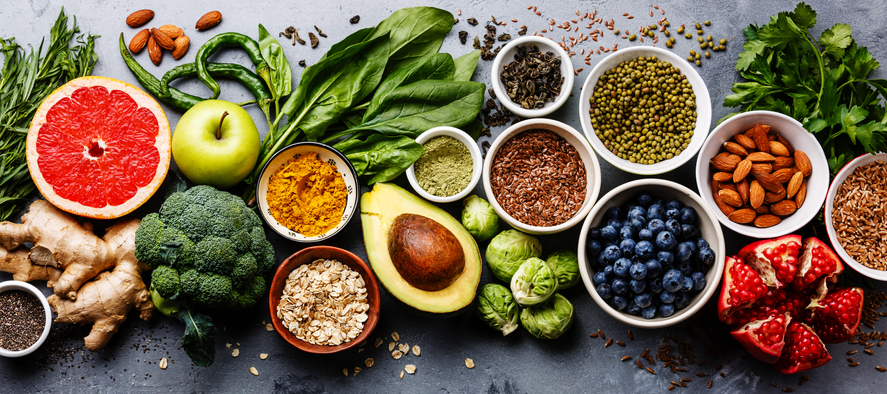Obesity has become one of the leading causes for premature death around the world (Ritchie & Roser, 2017). Consequently, the links between diet and physical health have been researched intensely. However, the physical aspect is only one factor that a balanced diet can have on the body. With a rise in the general public’s awareness of the foods they consume and the positive impact it has on their well-being, a growing academic focus on the benefits of healthy eating has proven that there is also a vital link between diet and mental health.
At Rhodes Wellness College, our Professional Integrative Nutrition Diploma provides a bridge between nutritionists and counsellors. With the understanding that nutrition can have a profound impact not only on an individual’s physical health, but also their emotional, mental, and spiritual well-being, our graduates utilize a variety of tools to help lead their clients to success. With this unique skillset, our graduates help clients face issues such as depression, addiction, and trauma and find motivation to make the nutritional changes that will benefit their overall health.
Keep reading to learn more about the link between diet and mental health, and the impact you can make as a nutritionist after your diploma program.
The Brain is Directly Connected to the Gastrointestinal Tract
Recent studies have shown a link between gut health and central nervous system (CNS) disorders such as depression and anxiety (Clapp et al., 2017). The gastrointestinal track is the passageway of the digestive system by which foods enter the body and wastes are expelled. Billions of bacteria live within the tract and directly affect the production of neurotransmitters that send messages from the gut to the brain, which is known as the gut-brain-axis (Clapp et al., 2017). Healthy foods lead to the growth of “good” bacteria, which increases neurotransmitter production, while unhealthy foods create “bad” bacteria that causes inflammation and negatively affect neurotransmitter production. For example, serotonin is a well-known neurotransmitter that positively affects mood, and about 90% of it is created by healthy bacteria in the gut (Martin et al., 2018).
Simply explaining the rewards of a healthy diet to a client may not be enough motivation to change habits that may have been formed over years, if not decades. Our nutritionist school is the first in BC to integrate professional counselling and nutritionist skills together. RWC provides our students with comprehensive knowledge about the psychological aspects behind changing habits and staying committed. You will also learn about the use of Cognitive Behavioural Therapy (CBT) strategies that have been proven successful in overcoming negative patterns related to both body image and diet (Jambi & Shaker, 2018). Helping clients learn how to identify their triggers and develop skills to overcome them will lead to successful and lasting changes to their lifestyle choices and mental health.

Our nutritionist school is integrated with professional counselling to help your future clients change habits and stay committed
Healthy Foods Can be Used as a Preventative Measure for Mental Health After Nutritionist School
The typical ‘Western Diet’ is made up of large portions that are high in saturated and trans fats, sodium, and sugar, and low in fruits and vegetables (Rakhra et al., 2020). Not only can an unhealthy diet decrease life expectancy by over a decade (Fadnes et al., 2022), but it can also have a negative impact on mental health. Researchers compared data from ten different countries around the world to analyze overall diet quality compared to the risk of depression and found that countries with healthier dietary patterns were associated with a reduced risk of depression (Li et al., 2017). Furthermore, another study found that diets that were high in sugars and saturated fats led to increased anxiety (Masana et al., 2019). These studies suggest that simply maintaining a healthy nutritional regiment and lifestyle can generally decrease the likelihood of mental health issues such as depression and anxiety.
Providing your clients with preventative care is just as important as dealing with issues that already exist. Every single nutrition course you take at RWC strengthens the tools you need to profoundly affect your clients emotional, mental, physical and spiritual well-bring. With your comprehensive knowledge and skill sets you will be able to confidently evaluate nutrition and lifestyle assessments, apply nutrition theory, develop meal plans, and assist your clients to recognize personal obstacles in their lives preventing healthy lifestyles and supply methods they can use to change their habits and achieve their goals.

Healthy foods are proven to increase life expectancy and decrease mental health issues such as anxiety and depression
Nutrition and Supplements Can Help with Existing Mental Health Issues
Although studies on the impact of nutrition on assisting with existing mental health issues are still relatively new, there is strong evidence of the positive impact a healthy diet can have. One such study focused on individuals who had moderate to severe depression and offered them dietary support emphasizing vegetables, fruits, whole grains, fish and so on, in addition to their ongoing treatments (Jacka et al., 2017). The studies showed that those that followed the diet had significant improvements of their depression symptoms, and that 32% of the diet group achieved remission while only 8% of the control group did.
In addition to the effects of a healthy diet, researchers are also investigating the influence that nutrients in the form of supplements can have on mental health. Links have been found between low levels of certain nutrients and negative general mood, anxiety, and depression (Rao et al., 2008). Omega-3 fatty acids have proven to be particularly important for brain development and cell signaling by reducing levels of inflammation and preventing and assisting with mental health issues such as depression and anxiety (Larrieu & Laye, 2018).
With your education and training as a nutritionist as well as a counsellor, you’ll be able to assist your clients to not only understand the components of a healthy diet, but also provide the tools they need to overcome personal hurdles and find the motivation to maintain a healthy lifestyle. Certification in both life skills coaching and integrative nutritional counselling grants our students a competitive edge, while also providing a variety of career options to consider after graduation.
Are you interested in learning more about our Professional Integrative Nutrition Diploma program?
Contact Rhodes Wellness College today for more information!
Works Cited
Clapp, M., Aurora, N., Herrera, L., Bhatia, M., Wilen, E., & Wakefield, S. (2017). Gut microbiota’s effect on mental health: The gut-brain axis. Clinics and practice, 7(4), 987. https://doi.org/10.4081/cp.2017.987
Fadnes, L.T., et al. (2022) Estimating impact of food choices on life expectancy: A modeling study. PLOS Medicine. doi.org/10.1371/journal.pmed.1003889.
Jacka, F. N., O’Neil, A., Opie, R., Itsiopoulos, C., Cotton, S., Mohebbi, M., Castle, D., Dash, S., Mihalopoulos, C., Chatterton, M. L., Brazionis, L., Dean, O. M., Hodge, A. M., & Berk, M. (2017). A randomised controlled trial of dietary improvement for adults with major depression (the ‘SMILES’ trial). BMC medicine, 15(1), 23. https://doi.org/10.1186/s12916-017-0791-y
Jambi, H. and Shaker, R., 2018. Effect of Nutrition Counseling by Using Cognitive-Behavioral Therapy on Body Weight and Body Image in Saudi Females. https://www.idosi.org/ajn/7(1)18/2.pdf
Larrieu, T., & Layé, S. (2018). Food for Mood: Relevance of Nutritional Omega-3 Fatty Acids for Depression and Anxiety. Frontiers in physiology, 9, 1047. https://doi.org/10.3389/fphys.2018.01047
Li, Y., Lv, M. R., Wei, Y. J., Sun, L., Zhang, J. X., Zhang, H. G., & Li, B. (2017). Dietary patterns and depression risk: A meta-analysis. Psychiatry research, 253, 373–382. https://doi.org/10.1016/j.psychres.2017.04.020
Martin, C. R., Osadchiy, V., Kalani, A., & Mayer, E. A. (2018). The Brain-Gut-Microbiome Axis. Cellular and molecular gastroenterology and hepatology, 6(2), 133–148. https://doi.org/10.1016/j.jcmgh.2018.04.003
Masana, M. F., Tyrovolas, S., Kolia, N., Chrysohoou, C., Skoumas, J., Haro, J. M., Tousoulis, D., Papageorgiou, C., Pitsavos, C., & Panagiotakos, D. B. (2019). Dietary Patterns and Their Association with Anxiety Symptoms among Older Adults: The ATTICA Study. Nutrients, 11(6), 1250. https://doi.org/10.3390/nu11061250
Rakhra, V., Galappaththy, S. L., Bulchandani, S., & Cabandugama, P. K. (2020). Obesity and the Western Diet: How We Got Here. Missouri medicine, 117(6), 536–538.
Ritchie, H. and Roser, M., 2017. Obesity. Our World In Data. https://ourworldindata.org/obesity
Rao, T. S., Asha, M. R., Ramesh, B. N., & Rao, K. S. (2008). Understanding nutrition, depression and mental illnesses. Indian journal of psychiatry, 50(2), 77–82. https://doi.org/10.4103/0019-5545.42391









